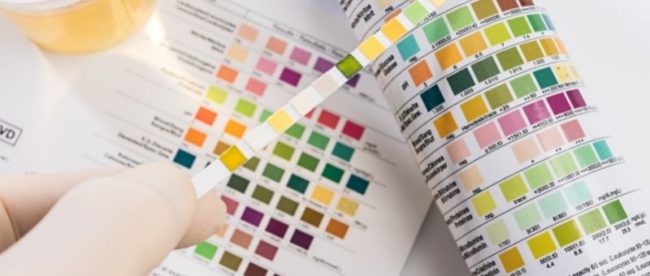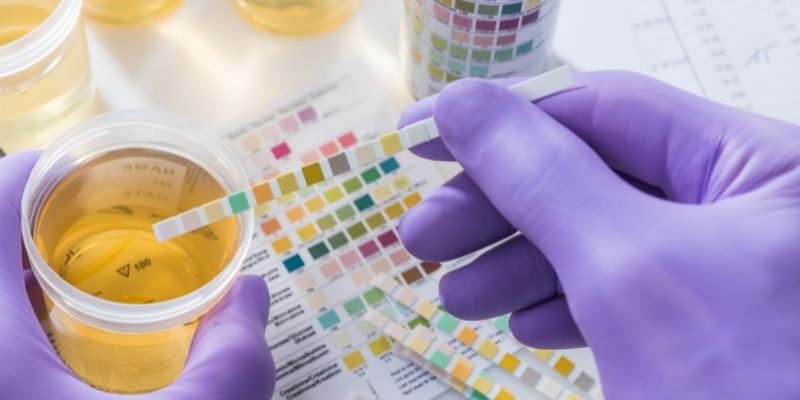Best Time to Test Ketones in Urine and How Often Should You Do It?

When it was invented in the 1920s, people used the ketogenic diet to treat epilepsy. But so much has changed. Today, the keto diet is a weight-loss tool.
But if you want to monitor the efficacy of the regiment, you must routinely test the ketones in your body. That raises the question. What is the best time to test ketones in urine? More importantly, what are the best methods for testing ketones in the body? These questions sound complicated, but they have simple answers.
Do you have a particular question about the best time to test ketones? Then use the table of contents below to jump to the most relevant section. And you can always go back by clicking on the arrow in the right bottom corner of the page. Also, please note that some of the links in this article may be affiliate links. For more details, check the Disclosure section at the bottom of the page.
Do Ketone Levels Fluctuate Throughout The Day?
Ketones are chemicals, and we all have them. The body makes ketones when it doesn’t have enough insulin to turn sugar into energy. It converts fat into ketones that your system can use as fuel.
If you want to lose weight, the production of ketones is a good thing because it removes fat. Testing ketones allows dieters to monitor the progress of their keto diet.
But keto levels can fluctuate throughout the day because of various factors, including the volume of carbs and proteins you consume with each meal, sleeping patterns, exercise, etc.
The fluctuations do not matter. From what I’ve noted in the past, the ketone level doesn’t matter either. A higher ketone level does not bring more significant weight loss results. Either way, you will lose weight by burning fat via ketosis.

How Often Should You Check Your Ketone?

Many people obsess over when to check ketones without realizing that consistency is more important than anything else. Try to identify a convenient time.
I measure my ketones at the same time every single day. You should do the same. For dieters, twice a day is enough. But diabetic patients do not have that luxury.
If your condition includes high blood sugar levels, perform a test every four hours. If you’re pregnant, once a day is sufficient.
Otherwise, if weight loss is your objective, endeavor to maintain consistency. Any schedule that doesn’t allow you to test ketones same time each day is not worth the trouble.

Best Time To Test Ketones
Before determining the best way to test ketones, you should identify the best time for testing ketones because the two factors are intertwined.
Best Time To Test Ketones in Urine
Urine tests are straightforward. You can perform one by dipping a dipstick into a urine sample and interpreting the color change using the chart that came with the test kit. Less than 20mg/dL is small. 30 – 40mg/dL is moderate while 80mg/dL and higher is large.
Some people get abnormal results because of starvation, prolonged vomiting, acute illness, and high fever. That is why many patients prefer to send their urine to a lab for a professional to test.
The most appropriate time to use the urine test for many people is early morning or late evening. For more accurate results, I prefer to perform the test before eating anything in the morning to sidestep the so-called Dawn Effect.
People that monitor their diets diligently will test ketones between meals, not just in the morning before they eat, but in the afternoon before lunch, three hours after lunch, before and after dinner. This allows them to gain more insightful information from their readings.
But whether you test ketones after eating or before, there is no best time to use ketone test strips. It is more important to remain consistent.
What Is The Best Time To Test Blood Ketones?
The urine test is convenient, but it doesn’t provide concrete information. Additionally, factors like hydration can affect your ketone readings. You see fewer ketones with urine strips as a keto diet stretches on because the body starts using ketones more efficiently.
A ketone blood meter delivers more reliable data. You have to place a drop of blood on the test strip. For many people, this is a turn-off. They don’t want to prick their fingers, which is why they flock to the urine test.
It takes seconds for the meter to reveal your ketone levels. The medical arena developed ketone blood meters for people with type 1 diabetes.
Today, you can use ketone blood meters to measure glucose. But you cannot rely on every blood glucose meter to measure ketones in the blood. However, are marketed as devices that can measure glucose and ketones.
Like the urine test, it is good to test ketones in the morning before you eat because it gives you a standard for comparison. You can wait an hour or two before running the test if your blood sugar tends to rise in the morning.
You don’t have to test again until dinner. Perform the blood test shortly before you eat to get a clear picture of your day. While readings tend to vary from person to person, the target is a reading of at least 0.5 mmol L. Otherwise, you’re not in ketosis.
Thanks for the graphics: Canva.com

Disclosure: At vegketodiet.com I only mention the products that I researched and considered worthy. But it’s important to note that we are a participant of several affiliate programs, including but not limited to VigLink and Amazon Services LLC Associates Program. As an Amazon Associate, this website earns from qualifying purchases. Also please note that I am not a doctor. As such readers are strongly recommended to make decisions that might affect their health by doing their own research. At vegketodiet.com I only document and describe thoughts, researches and ideas that proved to be working for me.

